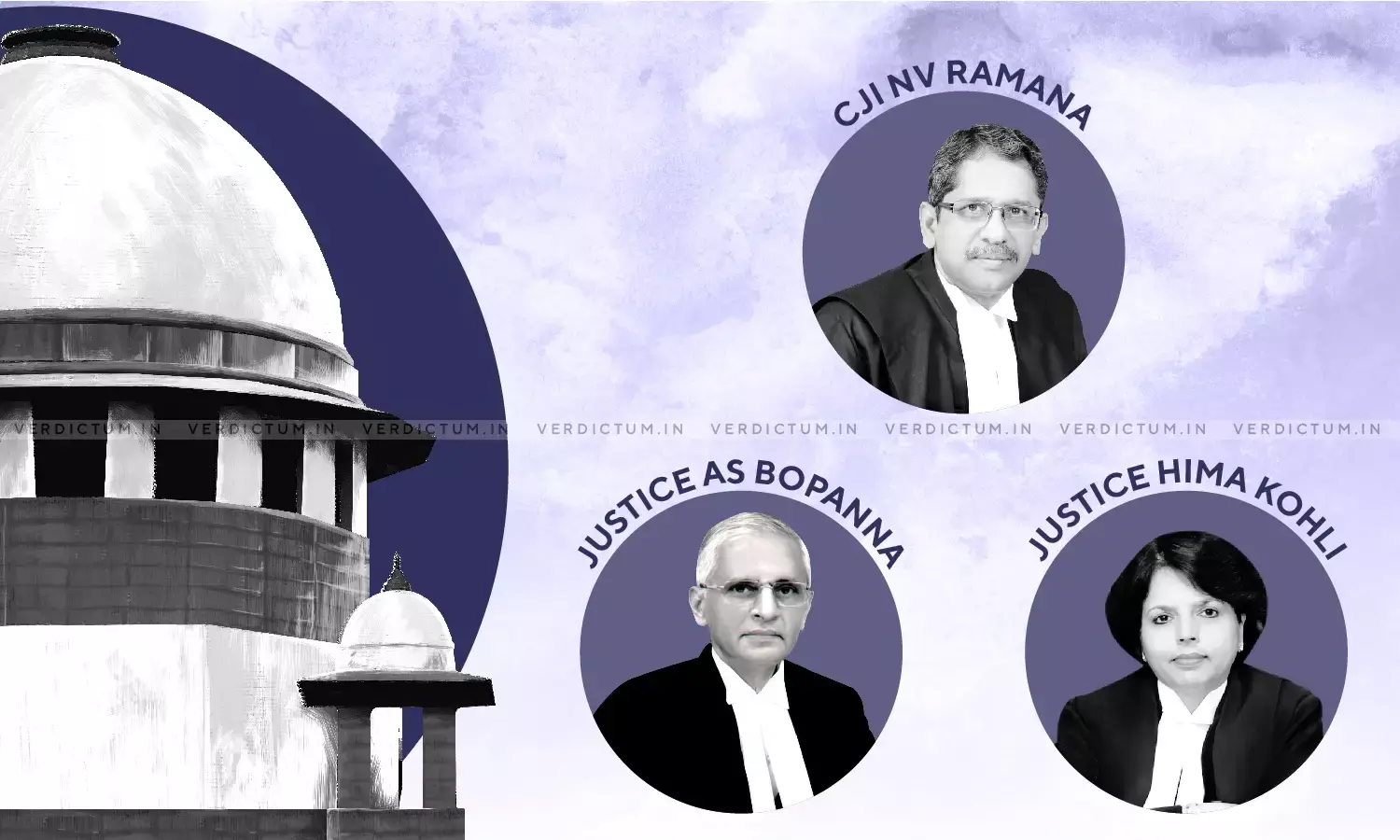Mere Brandishing Of Firearm Or Knife To Threaten, Without Using It Is Sufficient To Constitute Offence U/s. 397 Of IPC– Supreme Court

A three-judge Bench of CJI NV Ramana, Justice AS Bopanna, and Justice Hima Kohli has held that mere exhibition, brandishing, or holding the firearm and not actually using it to fire is sufficient to constitute an offence under Section 397 IPC.
Advocate Mr. Shishir Kumar Saxena appeared for the Appellant, while Advocate Mr. Sunny Choudhary appeared for the Respondent before the Court.
The Supreme Court was hearing an appeal assailing the judgment of the Madhya Pradesh High Court which had upheld the judgment of the Trial Court. The Trial Court had convicted the Appellant under Sections 392 and 397 IPC read with Sections 11/13 of Madhya Pradesh Dakaiti Aur Vyapharan Pravbhavit Kshetra Adhiniyam 1981 Act (MPDVPK).
The Appellant was sentenced to Rigorous Imprisonment of 7 years with a fine of Rs. 1,000/- in default of the same, further imprisonment of 4 months. Appellant-Accused was also convicted under Section 25(1-B) (a) of Arms Act to undergo one-year Rigorous Imprisonment with fine of Rs. 500 in default of the same to further undergo 2 months Rigorous Imprisonment.
In this case, the Appellant- Accused who was having a gun pointed it towards the chest of the Complainant and demanded to part with the money. As he did not have money, the keys of the Complainant's motorcycle were snatched and his mobile phone was also taken by the Appellant.
The Appellant contended before the Supreme Court that firstly, the charge under Section 397 IPC would not be sustainable since the gun had not been used and conviction could only be sustained if the offender uses any deadly weapon while committing robbery. Further, it was argued that the charge under Section 397 IPC was not sustainable against the Appellant since there was no serious allegation or proof of the Appellant having used any weapon in the incident.
Further, the Appellant argued that the charge under Section 392 IPC was proved and he had already undergone a sentence of nearly 4 years which was sufficient punishment.
The Respondent argued before the Court that the gun from the Appellant had already been recovered and examined by the Expert. Further, it was contended that the actual use of the firearm by firing from it was not required but the exposure of the weapon so as to create fear in the mind of the victim was sufficient to prove the charge under Section 397 IPC.
The two issues which were dealt with by the Court were –
i) Whether the charge under Section 397 IPC was sustainable since the firearm was not put to use; and
ii) Whether the charge under Section 397 IPC was sustainable as there was no material or evidence to indicate that the Appellant used the firearm, even if it was alleged that the incident had occurred.
The Apex Court while relying on various precedents observed, "It is clear that the use of the weapon to constitute the offence under Section 397 IPC does not require that the 'offender' should actually fire from the firearm or actually stab if it is a knife or a dagger but the mere exhibition of the same, brandishing or holding it openly to threaten and create fear or apprehension in the mind of the victim is sufficient."
"The other aspect is that if the charge of committing the offence is alleged against all the accused and only one among the 'offenders' had used the firearm or deadly weapon, only such of the 'offender' who has used the firearm or deadly weapon alone would be liable to be charged under Section 397 IPC," the Court held.
Further, the Bench observed, "It is no doubt true, that the appellant had participated in the offence of committing robbery since ultimately the motorcycle was hidden at a place which was known to the appellant and the property seizure memo indicates that the motorcycle was recovered at the instance of the appellant that certainly constitutes an offender under Section 392 IPC."
The Court also noted that the charge under Section 397 IPC can be fastened on the offender who actually uses the firearm.
"Since the facts and the evidence does not indicate that the appellant could be construed as an 'offender' who used the firearm, the charge alleged against him and held to be proved by the trial Court as also the High Court under Section 397 IPC and Section 11/13 of MPDVPK Act, 1981 cannot be sustained," the Court added.
However, the Bench held that since the Appellant committed robbery which stood established, the conviction handed down by the Trial Court and the High Court under Section 392 IPC was sustainable.
The Court set aside the conviction of the Appellant under Section 397 IPC. Also, the conviction of the Appellant under Section 329 IPC as upheld by the High Court was sustained and partly allowed the appeal.
Click here to read/download the Judgment

